Key takeaways:
- Kotlin’s expressiveness and conciseness enhance productivity compared to Java, allowing for seamless integration with existing Java codebases.
- Setting clear goals and adjusting them along the learning journey keeps motivation high and aids in skill acquisition.
- Engaging in practical projects, such as app and game development, solidifies understanding of Kotlin and programming concepts.
- Active community involvement and teaching others can reinforce knowledge and provide valuable insights during the learning process.
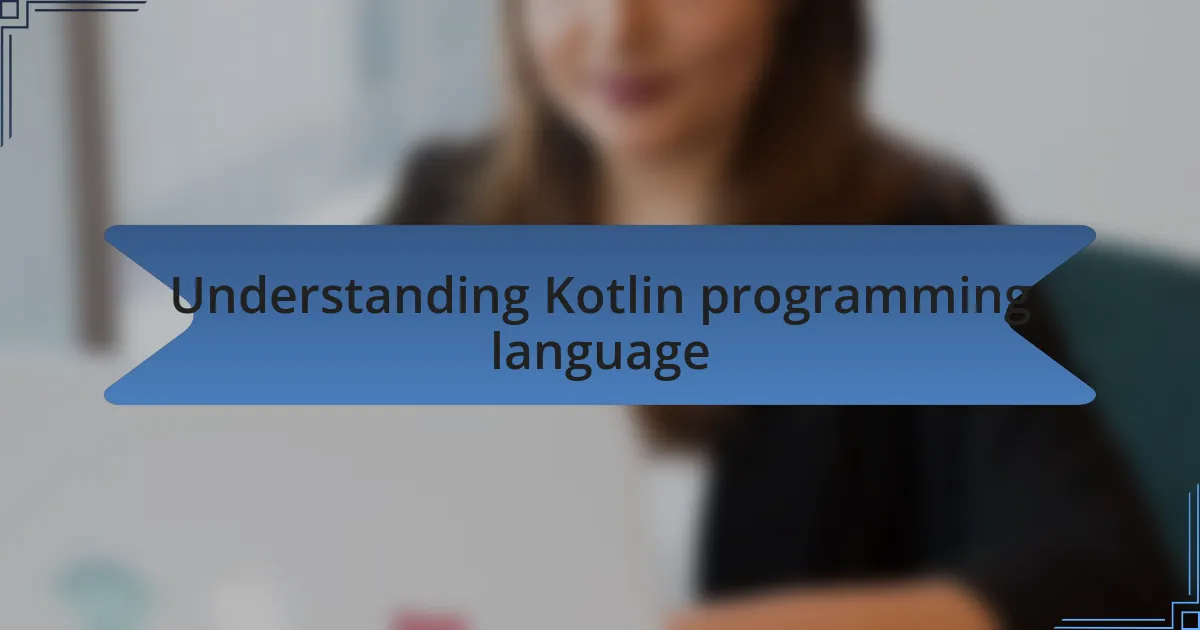
Understanding Kotlin programming language
Kotlin is designed to be expressive and concise, which immediately caught my attention when I started learning it. I remember the relief I felt realizing that I could write less code while achieving the same functionality as in Java—what a game changer! This efficiency sparked my curiosity to dive deeper into its features and how they compared to languages I was already familiar with.
One of the most compelling aspects of Kotlin is its interoperability with Java. Have you ever felt constrained by a programming language’s limitations? I certainly did, but with Kotlin, I found that mixing and matching Java and Kotlin code was seamless. It allowed me to leverage existing codebases while gradually transitioning to a more modern approach, which felt empowering during my learning journey.
Kotlin’s use of null safety also resonated with me, especially since I’ve experienced those frustrating moments where null pointer exceptions have derailed projects. The way Kotlin forces you to handle nullability upfront not only reduces errors but encourages a more thoughtful approach to coding. This capability made me feel like I was learning a language that anticipated my needs, fostering a deeper connection with the programming process itself.
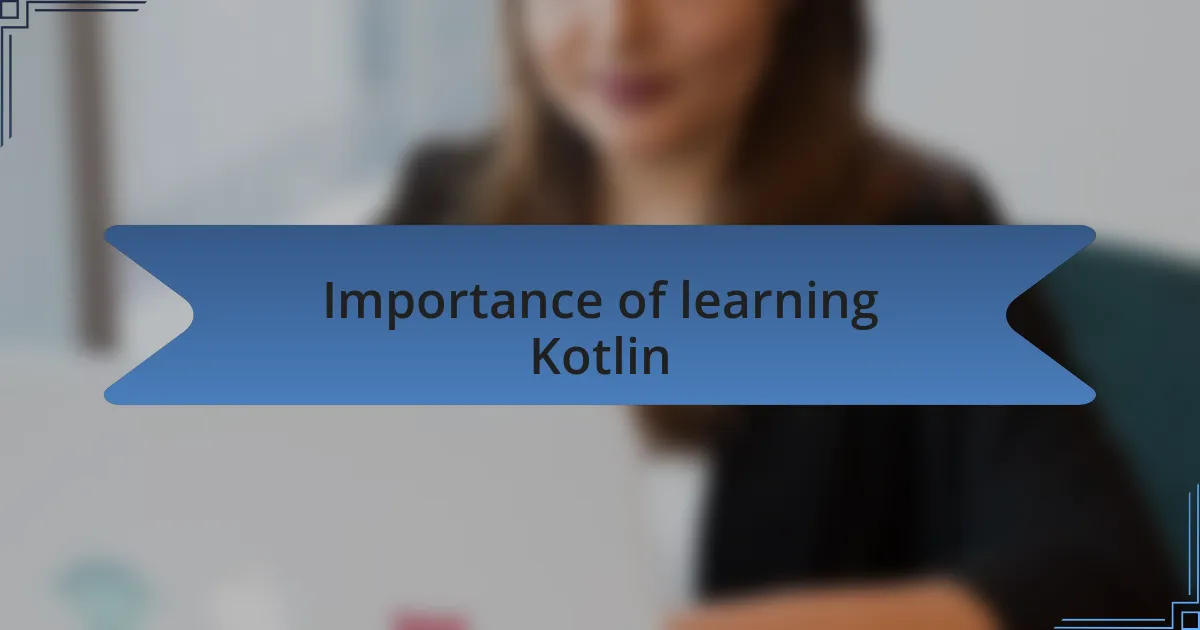
Importance of learning Kotlin
Learning Kotlin is important not only for its modern syntax but also for its powerful capabilities in Android development. When I first started creating mobile apps, the thought of managing complex codebases was daunting. However, Kotlin’s concise syntax made app development not just manageable but enjoyable. I remember feeling a wave of confidence wash over me when I could quickly read and understand code I had previously found overwhelming.
Moreover, Kotlin’s growing popularity in the tech community cannot be ignored. It opens up immense opportunities in a job market increasingly seeking developers who are skilled in modern programming languages. A few months into my learning, I attended a local tech meetup, and to my surprise, many conversations circled back to Kotlin. I realized it was becoming a valuable asset in my professional toolkit, propelling my career forward.
Another aspect that stood out to me is Kotlin’s strong community support. Engaging with forums and groups filled with passionate Kotlin learners and experts created a sense of belonging. Have you ever found a group that just clicks? That’s how I felt. This sense of community not only accelerated my learning but also provided ongoing motivation and inspiration along the way.
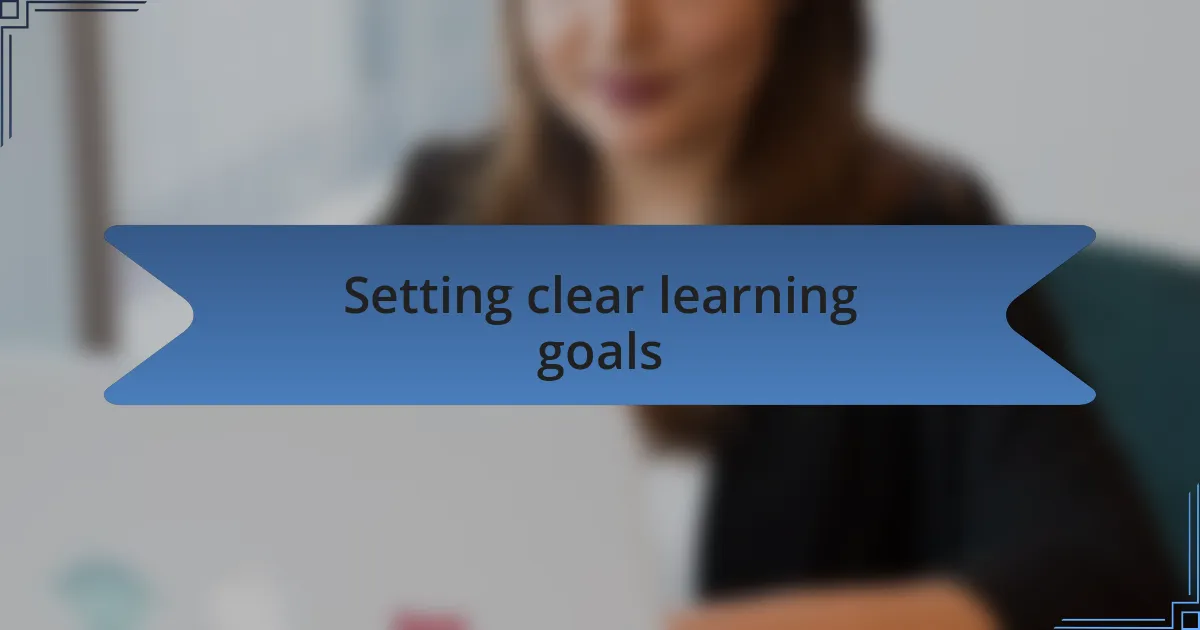
Setting clear learning goals
Setting clear learning goals is crucial in navigating the journey of mastering Kotlin. When I first embarked on this path, I took a moment to define what I truly wanted to achieve. Did I want to build a specific app, or was I aiming for a general understanding of Kotlin concepts? By establishing clear objectives, I found myself more focused and motivated, as if I had a map guiding me through the vast landscape of programming.
One memorable goal I set was to complete a small project every two weeks. This made the learning process tangible and rewarding. Each time I finished a project, I experienced a sense of accomplishment that kept me motivated. I vividly remember the joy of finishing a simple weather app; it felt like I was not just learning, but creating something real from my efforts. What goals can you set that could transform your learning experience?
As I progressed, I also learned the value of adjusting my goals. Not every target I set initially was met, and that was okay. I began to see those moments not as failures but as opportunities to refine my focus. This adaptability ultimately enhanced my learning journey, making each step purposeful and aligned with what I was genuinely passionate about. Have you thought about how flexible goals might benefit your own learning process?

Choosing the right resources
When it comes to choosing the right resources for learning Kotlin, I found that personal recommendations can make a world of difference. Initially, I relied heavily on online forums and coding communities. One gem I discovered was a Kotlin ebook recommended by a fellow developer. Diving into that resource opened my eyes to practical examples and real-world applications, making the learning curve feel less steep. Have you ever considered how much a well-recommended resource could enhance your understanding?
I also experimented with various platforms—some were video-based, while others offered text-based tutorials. During this exploration, I realized that engaging, hands-on resources worked best for me. There was a specific online course where I wrote actual code alongside the lessons, and it felt like I had a mentor by my side, guiding me through each challenge. The hands-on approach solidified my learning because I was not just passively consuming information; I was actively applying it. What type of learning style resonates with you the most?
As I progressed, I compiled a personal library of resources that felt right for my Kotlin journey. This collection included everything from YouTube channels to free coding bootcamps. I found joy in curating those materials, knowing each one contributed to my growth. It reminded me of building a customized toolkit, where each resource had a purpose and fit my learning needs. Are you ready to start your own collection of resources tailored just for you?
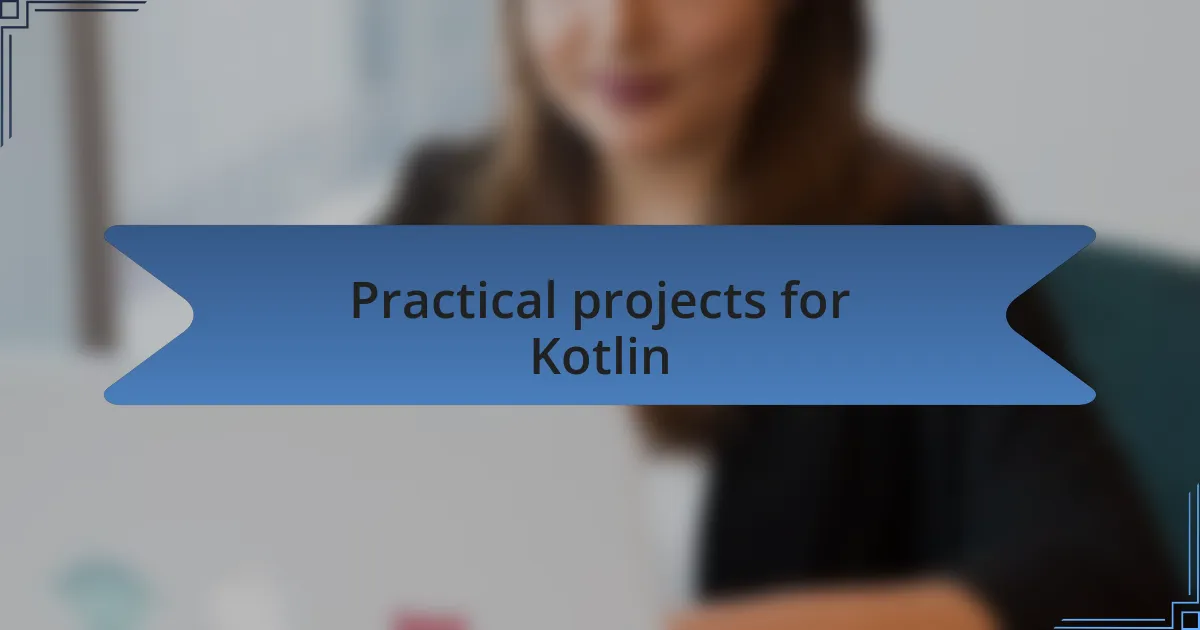
Practical projects for Kotlin
One of the most rewarding projects I undertook while learning Kotlin was developing a simple note-taking app. It started as an idea to help me organize my thoughts better, but it turned into a tangible product that I could use daily. Seeing my code come to life was exhilarating—have you ever experienced that moment when you realize your work can solve a real problem?
Another project that pushed my Kotlin skills further was creating a weather app that uses an API to fetch data. This required me to dig deep into Kotlin’s coroutines for asynchronous programming, and it taught me so much about handling data in real-time. I vividly recall how satisfying it felt as I transitioned from compiling errors to seeing accurate weather forecasts displayed in my UI. Isn’t it amazing how working on projects can deepen your understanding of programming concepts?
One final endeavor that I found particularly engaging was a small game built with Kotlin. Gamification made the learning process fun while helping me grasp complex algorithms needed for game logic. It was a thrill to share my game with friends and gather their feedback, which showed me the importance of user experience—even as a beginner. Have you thought about how gamifying your learning can spark your creativity?

Tips for effective practice
When it comes to effective practice, deliberately allocating time for coding is crucial. I remember setting aside specific hours each week dedicated solely to Kotlin programming. This consistency not only kept my momentum going but also helped me build a habit. Do you have a regular coding schedule that keeps you accountable?
Another tip I found beneficial is to learn by teaching. As I started explaining Kotlin concepts to fellow learners, I realized I was solidifying my own understanding. It was fascinating to observe how articulating ideas can reveal gaps in my knowledge and push me to explore those areas further. Have you ever tried explaining a concept to someone else to see how well you really grasp it?
Finally, don’t underestimate the power of community engagement. Participating in forums stirred up my enthusiasm and provided valuable insights from other learners and seasoned developers. When I shared my challenges and successes, I often received wisdom that helped me approach problems from different angles. Have you tapped into any communities that inspire and challenge you in your learning journey?
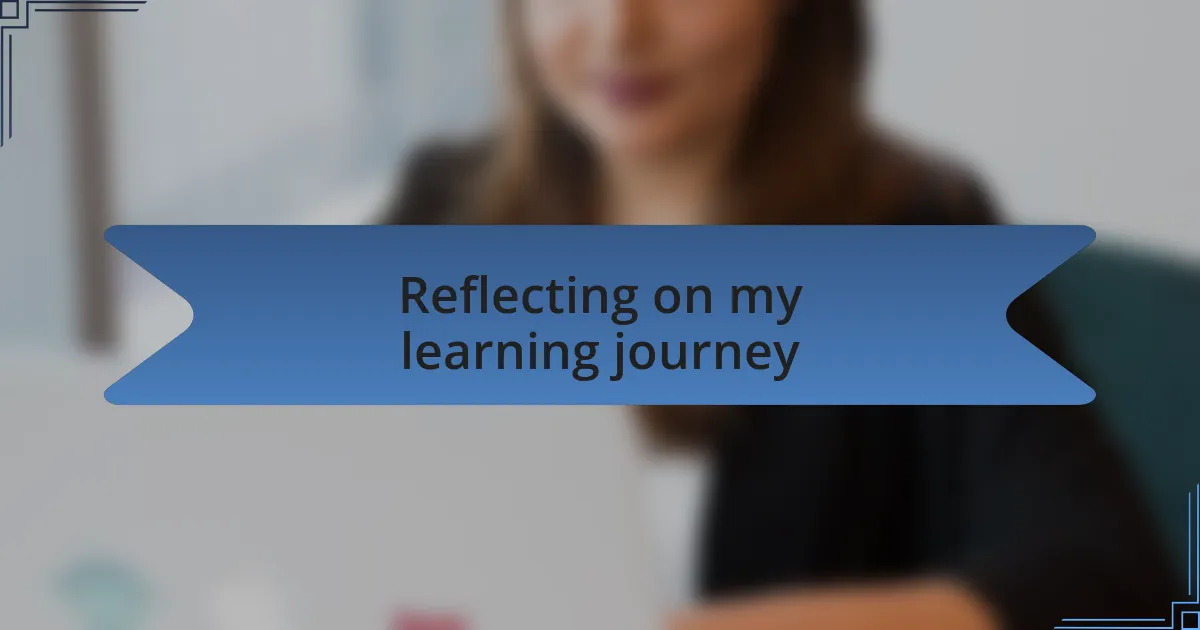
Reflecting on my learning journey
Reflecting on my learning journey in Kotlin, I often find myself thinking about those initial moments of confusion. The syntax felt foreign—like learning a new language where I could only stumble through basic conversations. However, I distinctly recall the thrill that accompanied each small breakthrough, whether it was writing my first function or successfully debugging my code. Did you ever feel that same rush when you finally cracked a tough problem?
As I navigated different challenges, it became evident that the process of learning was not always linear. There were days filled with frustration, where I felt like I was swimming against the current. Yet, it was during these moments of struggle that I learned the most about patience and resilience. Isn’t it interesting how setbacks can sometimes become the most impactful lessons?
Looking back, I can see how each tiny triumph contributed to my overall understanding of Kotlin. I remember celebrating the completion of small projects, each serving as a building block in my skill set. These projects were not just about coding; they were stepping stones that guided me toward a deeper appreciation of programming concepts. How have your milestones shaped the way you view your own learning journey?